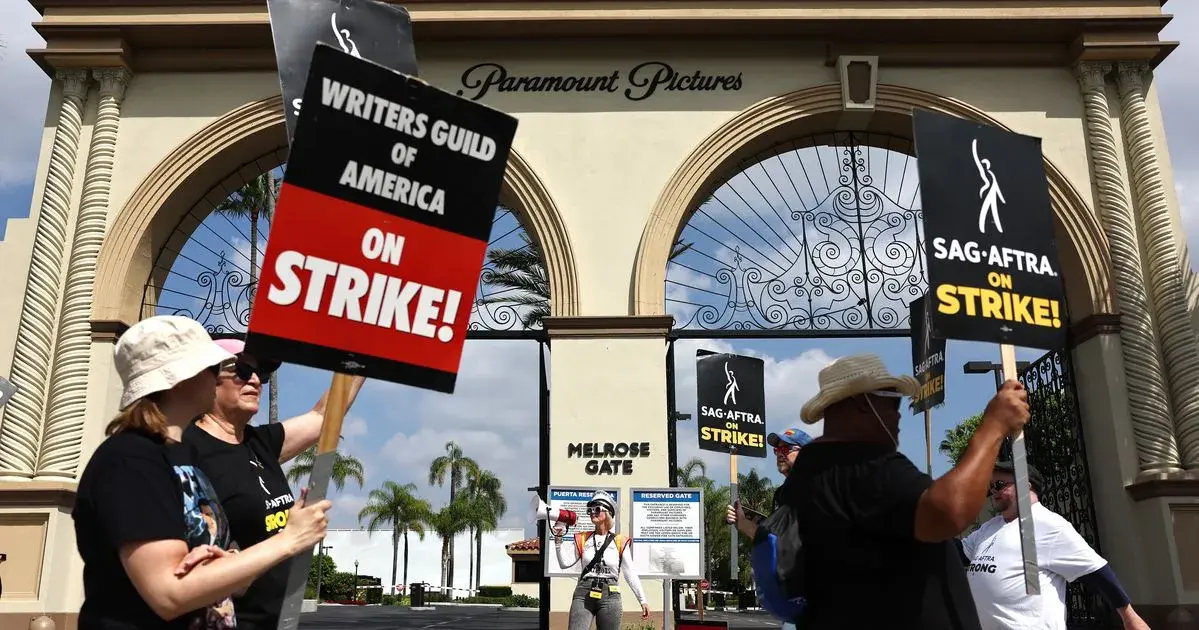Nearly five months after thousands of film and TV writers went on strike over more equitable pay and working conditions in the streaming era, effectively shutting down the entertainment industry, Hollywood studio and streaming executives at long last have reached a tentative deal with the Writers Guild of America, East and West.
In an email to members late Sunday, the union said it had reached “an agreement in principle on all deal points, subject to drafting final contract language.”
The union said it will share details about what the union negotiators and studio executives agreed to once union leadership reviews the final language in the agreement.
“What we have won in this contract—most particularly, everything we have gained since May 2nd—is due to the willingness of this membership to exercise its power, to demonstrate its solidarity, to walk side-by-side, to endure the pain and uncertainty of the past 146 days. It is the leverage generated by your strike, in concert with the extraordinary support of our union siblings, that finally brought the companies back to the table to make a deal,” the email to members continued. “We can say, with great pride, that this deal is exceptional—with meaningful gains and protections for writers in every sector of the membership.”
Once ratified by the union members, the agreement could have huge effects, setting historic precedents on major industry-wide issues. Throughout the strike, writers have framed the fight as an existential one, showing the ways longstanding inequities in the industry have jeopardized the future of writing as a profession and restricted the types of people who can make a living as a writer in Hollywood. The issues that led them to strike include dwindling pay while corporate executives reap profits from writers’ work and the need for guardrails around the use of artificial intelligence. (HuffPost’s unionized staff are also members of the WGA East, but are not involved in the strike.)
The resolution to the strike means writers can soon resume work on film and TV shows, putting an end to a monthslong standstill on virtually all film and TV production. Looming deadlines likely motivated the studio executives, represented by the trade group Alliance of Motion Picture and Television Producers, to finally reach a deal with the writers. Had the strike stretched further into the fall, network shows would not have enough time to put together a partial season of programming.
In the email to members, the union said that the writers are technically still on strike, since the agreement is subject to votes from the union’s negotiating committee and then from leaders of the WGA West and East. Those votes are tentatively scheduled for Tuesday, the WGA said.
Following those votes, union leaders would then authorize a full membership ratification vote on the agreement. During the ratification vote, members would then be allowed to return to work, the union said.
Throughout the strike, writers have had the upper hand in terms of public perception, picketing nearly daily in front of major studios and corporate headquarters in New York and Los Angeles. In addition to laying out the stakes of the strike in no uncertain terms, they were also able to point to the massive corporate greed of Hollywood executives, showing the huge gap between executive salaries and most writers’ relatively meager wages.
It did not help that studio executives continually dug a deeper hole for themselves and added to the public perception of them as cartoon villains — including giving anonymous quotes to Hollywood trade publications asserting the strike was meant to bleed writers dry. For instance, in July, a studio executive anonymously told Deadline: “The endgame is to allow things to drag on until union members start losing their apartments and losing their houses.”
The writers’ ability to wield the power of public protest also got results. Earlier this week, Drew Barrymore reversed plans to resume her talk show without her striking writers, after she faced a week of massive public backlash. Her announcement set off a domino effect: Several more talk shows that had been slated to return while their writers are on strike also reversed their plans.
Since July, actors represented by the Screen Actors Guild have also been on strike over similar issues as the writers. While studio executives will need to reach a separate agreement with SAG-AFTRA, the resolution of the writers strike is an optimistic sign for a similar deal with the actors.
The twin strikes have marked a historic moment for Hollywood labor unions. They also come amid a turning point for the labor movement across the country. Just last week, workers represented by the United Auto Workers launched a series of historic strikes, the first time the union has conducted a simultaneous work stoppage at all three major U.S. automakers. In recent years, accelerated by the effects of the COVID-19 pandemic, workers across many industries have unionized, drawing attention to corporate greed, exploitation and inequality between corporations and workers.
Power to the workers!!!
🎉🎉🎉
Here’s a short summary of the linked article
Click to expand
The Historic Writers Strike Will Soon Be Over discusses the tentative agreement reached between Hollywood studios and the Writers Guild of America to end the nearly 5-month long writers’ strike. The union email to members said the agreement includes meaningful gains and protections for writers. Ratification of the deal could set historic precedents on issues like equitable pay and guardrails around AI use. The resolution means writers can resume work, ending the production standstill. Looming deadlines likely motivated the deal. The email outlined the ratification vote process. President Biden welcomed the deal, calling for fair worker compensation.
Throughout the strike, writers effectively used public protest and perception of corporate greed to gain leverage in negotiations.
This comment was generated by a bot. Send comments and complaints via private message.




